- Home
- Diane Gaston
Valiant Soldier, Beautiful Enemy Page 18
Valiant Soldier, Beautiful Enemy Read online
Page 18
Without answering, he hurried to assist her to dismount and led the horses to a spot where they could easily dip their muzzles into the water.
Miss Finch lowered herself gracefully to a grassy spot. “Come sit with me, Claude.”
He hesitated. What was proper in England for a stable worker to do?
What did he care? He was French and equal to any man…or woman.
He sat next to her.
She smiled over at him. “Tell me about Brussels and why you left your home to come here.”
He shrugged. “I wanted to travel.”
“I would love to travel!” She laughed softly. “Although I am not certain I would pick Lancashire to visit. I cannot imagine what attracted you to this place.”
One man attracted him to this place, but he could not explain that to this pretty girl. “Is Lancashire your home, miss?”
She averted her face, but not before he saw her expression turn solemn. “I grew up in Sudbury.” She turned back to him. “It is not far from Newmarket.”
“I have heard of Newmarket.” Newmarket was a place for horse breeding and racing, too. Claude knew of such places.
“But I have lived here at Rappard Hall for two years,” she went on, her expression composed now. “I am what we English call an impoverished relation. Lady Rappard, my mother’s cousin, was kind enough to give me a home.”
His brows knit. She was a member of the family.
She lifted her chin. “Oh, but you must not feel sorry for me. I am quite fortunate. Besides, Lady Rappard needs me. Mrs Dart, the housekeeper, is so old that she requires my help to properly run the house.”
“You are the housekeeper?” he asked, confused again.
She shook her head. “It is merely how I repay Lord and Lady Rappard for my livelihood.”
He did not know what to say. It seemed she was neither family nor servant, but something in between. He still did not know if he risked being sent packing for talking to her.
“It is not a bad thing!” Her cheerful tone seemed forced. “Of course, with my cousin George and his companions in residence, there is quite a bit more to do.”
Cousin George. His companions included Edwin Tranville. The man Claude had come to murder.
A cloud covered the sun and the stream no longer sparkled. Claude reminded himself he was not here to become enamoured of an English girl, no matter how prettily she smiled at him.
“I rode atop their coach, but that is all I’ve seen of the young gentlemen,” he said.
There was much more he wished to know about them, however. Such as, what time did they retire at night? Which bedchamber was Tranville’s?
She frowned, then glanced up at the clouds and stood. “Perhaps we should head back.”
He hurried to bring her horse to her and to help her mount. This time his thoughts were not consumed with how delicate she felt or how his fingers tingled from merely touching her. Tranville had intruded into his thoughts and his mind was filled with how he might find him alone.
They took a slow pace back to Rappard Hall, a pace that gave Claude more time to think about his quest for revenge. He lagged half a length behind her, and they did not speak. Still, he admired her confident handling of the horse, her comfort in the sidesaddle.
When Rappard Hall came into view Claude looked upon it with disdain. A château, it would be called in France, although certainly a French château would be grander. The house was large enough, but boxy in shape and constructed of red sandstone over which ivy and moss had grown. It had one large tower perched on top of its three storeys, as if it had been stacked there like a child’s set of blocks. The windows, however, were what most interested Claude. Which one would reveal Tranville?
“I will ride you to the door and take Pomona back to the stables for you.”
She smiled at his offer, as if it had been an unselfish one. “That would be so kind, Claude.”
He was not kind. He was a miserable dog. His intent was solely to more closely examine the house, to see where he might enter it, to discover where he might finally confront Tranville.
And kill him.
Gabe stowed the luggage in the gig and glanced at Emmaline. She stood stiffly, her face averted. He could almost feel the tension inside her. He’d been acutely aware of it ever since his brother had joined them at breakfast.
Cursed luck. What were the odds that a member of his family would visit Manchester at the same time, stay in the same inn and walk into the public rooms at the precise hour he sat there with Emmaline? Now it was almost noon. Paul’s appearance had delayed their departure. Half the day was nearly gone.
Even worse, Paul had gaped at Emmaline as if she were merely some doxy with whom Gabe was trifling. Gabe had seethed at the knowing look Paul had given him and at the tone of disapproval in Paul’s voice.
He frowned with the memory and raised the hood of the carriage so Emmaline would be shaded from the sun and protected from any sudden shower. He turned to help her into the seat.
Emmaline stepped back. “How could you do this to me, Gabriel?”
How was he to answer? His brother’s presumptions about her were rude, but not entirely incorrect. He and Emmaline were lovers, after all. The previous night proved that.
“My brother’s appearance was unfortunate—” he began.
She waved a hand. “Do you think I care about that? You broke your word to me! That is what I care about. You dictate a visit to this uncle when you know all I want to do is find Claude and stop him.”
He was shocked. “You think I broke my word?”
Was her opinion of him so low that she thought he would forget their purpose of being together or the promise he’d made to her about continuing the search?
“What else can I believe when I heard you with my own ears?” She crossed her arms over her chest. “I do not wish to visit this uncle, Gabriel. I will not go with you.”
The horse shuffled, as if impatient to be moving. So was Gabe. His bargain with her was to prevent her son from murdering Edwin Tranville, and, even though his chances of success were now exceedingly slim, he intended to try every means he could think of to accomplish that feat.
He looked directly into her eyes. “We search for Claude, Emmaline. What I spoke to my brother was fiction. What I said to you was truth.” He paused. “Unless you would have preferred I explain to him we merely shared a bed during our quest to keep your son from murdering a baron’s son?”
She looked down at her feet. “I did not realise.”
He extended his hand and this time she allowed him to lift her up to the gig’s seat. He climbed up beside her and signalled the horse to begin moving. Though he could not remember when he’d last driven a carriage, the skill came back readily and he eased the horse into the traffic on the road.
She was silent, but subdued. How easily she had misjudged his character.
And his feelings towards her.
As he drove he spoke, “My uncle is to the northwest. We will head south. Towards London. London or Brighton seems their most likely destination.”
The horse faltered as other carriages, wagons and riders clogged the road out of Blackburn. Gabe pulled on the ribbons to keep the horse steady.
“I am sorry, Gabriel,” she murmured.
Her wounding words still stung, no matter her apology.
She turned to him and he caught her earnest expression. “Why did you tell your brother we were betrothed?”
She did not understand? He gritted his teeth. He gave her a scathing look. “I had the frivolous notion to protect your reputation.”
“Oh,” she murmured.
“I did not forget the terms of your bargain, if that is what you presumed.” Being considered the sacrifice she would make in return for her son’s life was hardly something that would slip his mind.
Gabe admitted to himself a fledgling hope that sharing a bed with her might have altered matters between
them. He would not make that mistake again. Oh, he would make love to her again, if she wished it. He’d be a fool to deny himself such pleasure. From now on, though, he would not forget that what they shared in bed could never equal her bond with her son.
Gabe manoeuvred the gig on to the London road.
They rode in silence for a couple of hours until Gabe sighted a posting inn in the distance.
“We’ll stop here. The horse can rest and refresh herself while we enquire about Edwin or Claude.”
They enquired if anyone had seen, in recent days, four young gentlemen in a private carriage with a crest on the side, a crest with a bird.
No one remembered seeing such a vehicle, nor did they recall a young Frenchman travelling alone.
They stopped at every posting inn on the road, asking the same questions, receiving the same answers. Gabe and Emmaline travelled almost as far as Manchester before Gabe turned around, taking a different route back towards Blackburn and checking at different inns. The answers were still the same. No hint of Edwin Tranville or Claude.
With each mile Gabe felt Emmaline’s distress grow. He could not help but be affected by her growing despair.
The last inn where they made enquiries was nearly back to Blackburn and the sky was turning dark.
“We should stay the night here,” Gabe told her. “Tomorrow we’ll try in a different direction.”
She nodded, looking exhausted and defeated.
That night they shared a room and a bed and Gabriel made love to her again, not quite as impersonally as he’d vowed. Their passion was fuelled by the tension of the day and by Gabe’s need to comfort her against her fear that perhaps they were already too late.
Before they roused from the bed the next morning Gabe made love to her again. As they were preparing to head out, he bought a newspaper and searched its columns for news of a murder having already occurred. No news item was found.
This time Gabe drove the gig east towards the Irish Sea, passing through Preston and Leyland and Chorley, attempting to cover any road Edwin and his friends might have taken.
To no avail.
Two more days passed like this as they headed north, then west. Gabe could not ease Emmaline’s despair.
“We will try again tomorrow,” Gabriel said to her, as he held her in his arms once again. In spite of all it meant to him, the ultimate loss of her, his own heart ached at the pain she endured on behalf of her son.
She pressed her face against the skin of his chest and stifled a sob. “What if we are too late?” she asked him. “What if we are too late?”
Claude swept the floor near the stable doors, keeping busy while anticipation throbbed through his every vein, the anticipation of seeing Louisa Finch. She came to the stable to ride every morning at this time, and Claude made certain he was the groom available to ride with her.
No, not Louisa Finch. He must not make her important to him. It was the prospect of riding a fine horse like Apollo that appealed to him, he told himself. It was the chance to gallop over fields and hills, the air whipping at his clothing and filling his lungs. The pleasure of it almost drove thoughts of revenge out of his mind.
Almost.
At night he’d left his bed to creep up to the house. Already he’d discovered what doors were left unlocked, allowing him entry. He’d managed to glimpse Tranville, but still did not know where he slept. When he discovered Tranville’s bedchamber, Claude’s plan was to confront him there, make him divulge the names of the two soldiers who’d killed his father, and plunge the stiletto into Tranville’s heart.
By morning, when Tranville’s body was discovered, Claude would be far away.
The only part that bothered him was that Louisa would know he’d killed Tranville. She would never understand why he must commit murder. She’d hate him for it.
A sound made him glance up from his work.
Louisa walked towards him.
As she’d done the last three days, she would ask to ride Pomona and he would ride with her.
His pulse quickened at the prospect of her bright, daring eyes, her rose-tinged cheeks, her expressive pink lips.
“Good morning, Claude. Will you ride with me today?” This morning her smile seemed forced; her tone, sad.
What had happened? She always appeared happy when she came to ride, as if she, like he, grasped freedom only on the back of a horse.
“Yes, miss.” He doffed his cap and banked his initial enthusiasm. “Do I saddle Pomona for you as before?”
“Yes, indeed.” She seemed to be making an effort to sound cheerful.
While he saddled Pomona and Apollo she was uncharacteristically silent.
“What is troubling you, miss?” he could not help but ask.
“Troubling me?” She made a pretence of a smile, but her voice cracked. “Why, nothing.” She paused. “An attack of the blue devils, I suppose. It will pass.”
He did not know what blue devils were, but something had changed her usual sunny manner.
He helped her onto her horse and his senses flared as before, but he felt as if he’d committed some offence by feeling his excitement so viscerally.
When they rode out of the stable, all of the young gentlemen—Tranville included—were walking towards them. Claude was careful to keep his eyes downcast.
“So this is where you disappear to, Cousin?” George Rappard said.
“I like to ride in the morning,” she responded in a tight voice.
None of the young men seemed to give Claude any notice, but he was acutely aware of Tranville, his scarred face looking sallow in the morning light.
“Where is the gamekeeper?” her cousin went on. “We have a notion to go fishing and need poles and tackle.”
“I have no idea where he is,” she responded. “You should find the poles in his shed.”
Claude could volunteer to find the poles and tackle for the young men. Perhaps he would be ordered along to assist them as he’d been ordered to ride with Louisa. This might be his opportunity to lure Tranville away from the others, to confront him and to exact his revenge.
All Claude needed to do was speak up.
And leave Louisa.
She moved her horse forwards, her spine rigid in the saddle. “Good day, Cousin. Gentlemen.”
Claude followed her.
When they were out of earshot of the young men, she turned to him. “Let us not gallop today,” she said.
“As you wish, miss,” he responded.
She continued, her voice as strained as it had been speaking with her cousin. “I thought we might ride to the abbey.”
There was an abbey nearby? Claude did not know the English had abbeys.
She went on, “George and his friends will not go there. I—I would not wish to disturb their fishing at the stream.”
She led him on a path they had not ridden along before. Claude followed, but the brief sight of Tranville again filled Claude’s nostrils with the scent of Badajoz. His father’s blood. Tranville’s drunken stench. Claude shook his head to dispel the memory.
He hated thoughts of Tranville to intrude during these brief interludes with Louisa. Usually when he rode with her the grass seemed greener, the sky bluer, the wildflowers more fragrant.
But today her mood—and his—was like a black cloud rumbling across the sky. He lowered his head and felt the darkness surround him.
They reached the crest of a hill and below them was the abbey.
“This is it?” Claude looked down on what was nothing more than piles of rubble, marking what must once have been walls. One tower still stood. Although it was open to the sky, it gave a hint to what grandeur once must have existed in this small valley.
“Is it not lovely?” she exclaimed, some of her usual liveliness returning.
To Claude it was a dreadful sight. What must have been a huge, thriving place was now nothing at all.
Louisa started down a path. She
looked over at Claude. “Come. Shall we explore?”
When they reached the pile of stones, they dismounted. The horses wandered to a steam nearby to quench their thirst. Claude supposed it must connect to the same stream in which he and Louisa usually watered the horses, the same stream in which Tranville and his friends would fish, but here it was no more than a thin strip of water easily crossed with one giant step.
Claude followed Louisa through an arched entrance. All the walls or their remnants were red sandstone, the same as Rappard Hall.

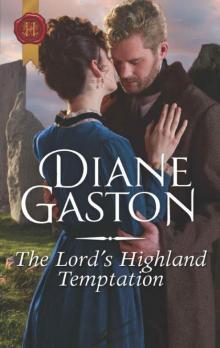 The Lord's Highland Temptation (HQR Historical)
The Lord's Highland Temptation (HQR Historical)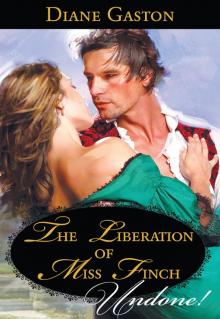 The Liberation of Miss Finch
The Liberation of Miss Finch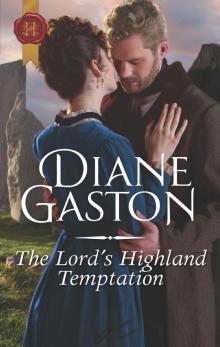 The Lord's Highland Temptation
The Lord's Highland Temptation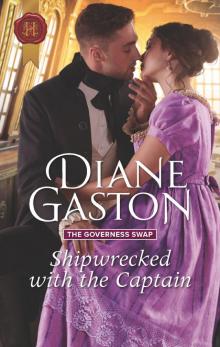 Shipwrecked with the Captain
Shipwrecked with the Captain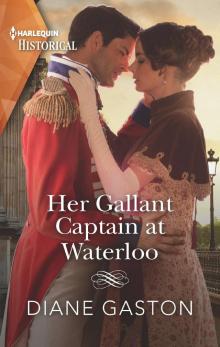 Her Gallant Captain at Waterloo
Her Gallant Captain at Waterloo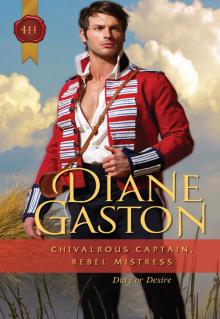 Chivalrous Captain, Rebel Mistress
Chivalrous Captain, Rebel Mistress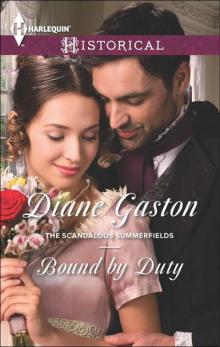 Bound by Duty
Bound by Duty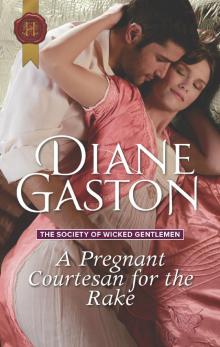 A Pregnant Courtesan for the Rake
A Pregnant Courtesan for the Rake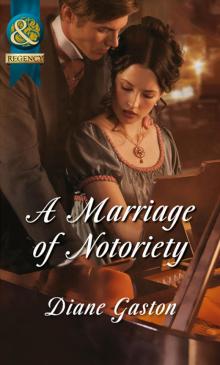 A Marriage of Notoriety
A Marriage of Notoriety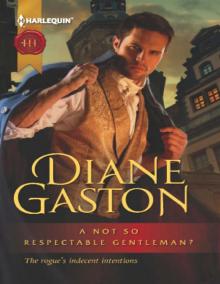 A Not So Respectable Gentleman?
A Not So Respectable Gentleman?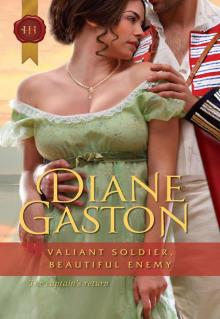 Valiant Soldier, Beautiful Enemy
Valiant Soldier, Beautiful Enemy A Reputation for Notoriety
A Reputation for Notoriety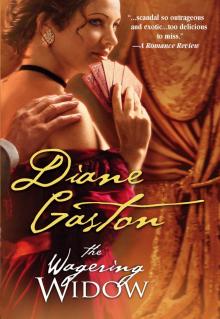 The Wagering Widow
The Wagering Widow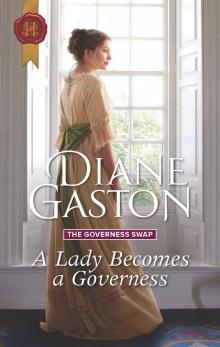 A Lady Becomes a Governess
A Lady Becomes a Governess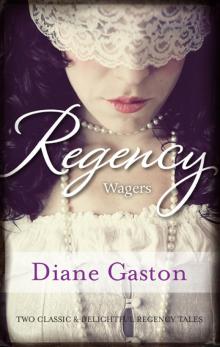 Regency Wagers
Regency Wagers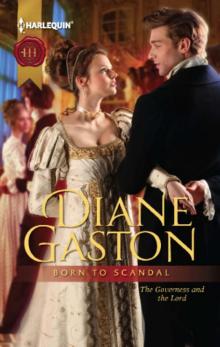 Born to Scandal
Born to Scandal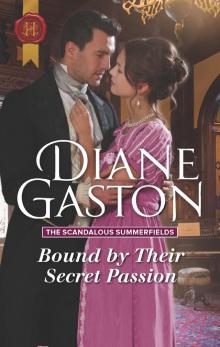 Bound by Their Secret Passion
Bound by Their Secret Passion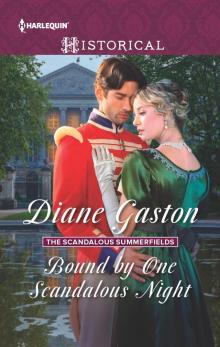 Bound by One Scandalous Night
Bound by One Scandalous Night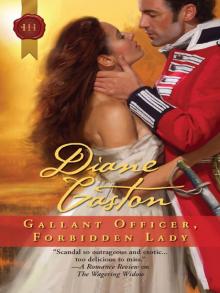 Gallant Officer, Forbidden Lady
Gallant Officer, Forbidden Lady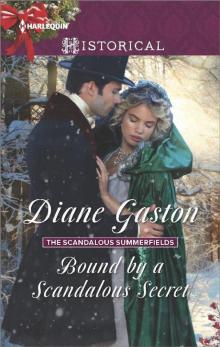 Bound by a Scandalous Secret (The Scandalous Summerfields)
Bound by a Scandalous Secret (The Scandalous Summerfields)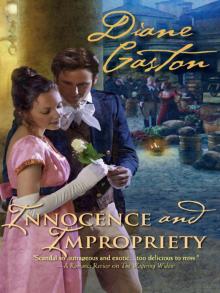 Innocence and Impropriety
Innocence and Impropriety